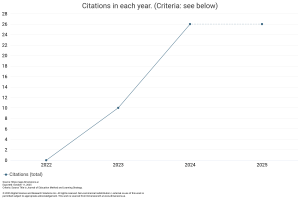Impact of Mental Health and Stress on Academic Performance among Students: A Literature Review
DOI:
https://doi.org/10.59653/jemls.v3i03.1755Keywords:
Mental Health, Stress; Academic, Performance among StudentsAbstract
This article discusses the impact of mental health and academic stress on students' academic performance through a literature review. The objective of this study is to identify how mental well-being and stress levels affect learning effectiveness and academic achievement. The method employed is a literature analysis of various studies that explore the relationship between mental health, academic stress, and learning outcomes. The findings indicate that stable mental health contributes positively to increased focus, motivation, and comprehension of learning materials. Conversely, unmanaged stress can impair concentration, reduce interest in learning, and negatively affect academic results. However, in certain cases, academic stress (when experienced at optimal levels, or eustress) can serve as a motivating factor that enhances academic performance. Factors such as the learning environment, social support, and teaching methods also play a role in moderating the impact of mental conditions on student achievement. Therefore, it is essential for educational institutions to provide mental health intervention programs, counseling services, and adaptive learning approaches to help students manage stress and improve their academic performance.
Downloads
References
Aditia, I. M., Adhari, P. A., Rostika, D., & Sudarmansyah, R. (2024). Pentingnya Pendidikan Kesehatan Mental di Lingkungan Sekolah Dasar: Perspektif Guru dan Peserta Didik. IJEDR: Indonesian Journal of Education and Development Research, 2(2), 705–711. https://doi.org/10.57235/ijedr.v2i2.1979
Akbar, M. A., Khairunnisa, K., Pepayosa, E., Sari, M. T., & Wahyuni, A. (2024). Kajian Literature: Pengaruh Bullying Terhadap Motivasi Belajar Siswa. Jurnal Ilmiah Profesi Pendidikan, 9(1), 76–81. https://doi.org/10.29303/jipp.v9i1.1868
Anggraini, S., & Sukartono, S. (2022). Upaya Guru dalam Meningkatkan Motivasi Belajar Peserta Didik di Sekolah Dasar. Jurnal Basicedu, 6(3), 5287–5294. https://doi.org/10.31004/basicedu.v6i3.3071
Astuti, F. F., & Ardi Zulhakim. (2021). Faktor-faktor yang Mempengaruhi Motivasi Belajar Siswa pada Mata Pelajaran Pendidikan Agama Islam di SD Negeri 115 Bengkulu Selatan. Jurnal Pendidikan Islam Al-Affan, 1(2), 227–234. https://doi.org/10.69775/jpia.v1i2.35
Astuti, S., Rukmana, D., & Pramudiani, P. (2022). The role of teachers and parents to improve children’s motivational learning in pandemic situation. International Journal of Evaluation and Research in Education, 11(3), 1162–1170. https://doi.org/10.11591/ijere.v11i3.22583
Fitriyani, F., Asrowi, A., & Hidayat, R. R. (2022). Keefektifan Teknik Mutual Stoytelling untuk Meningkatkan Motivasi Belajar Siswa SD. Jurnal Psikoedukasi dan Konseling, 5(1), 47. https://doi.org/10.20961/jpk.v5i1.49792
Hawla, N. A., Afrinaldi, A., Kamal, M., & Rahmi, A. (2022). Pengaruh Kesehatan Mental terhadap Efektivitas Belajar Siswa di SMAN 2 Koto Baru Dharmasraya. Jurnal Pendidikan Tambusai, 6(2), 8574–8581.
Ilma, I., & Usodo, B. (2024). Improving creative thinking skills and learning motivation through ethnomathematics-based interactive multimedia: An experimental study in primary school. Multidisciplinary Science Journal, 6(8). https://doi.org/10.31893/multiscience.2024141
Ismartaya. (2021). Pengaruh Motivasi, Stres, Dan Lingkungan Belajar Islami Terhadap Prestasi Belajar Dengan Lingkungan Belajar Islami Sebagai Variabel Intervening. Jurnal Tabarru’: Islamic Banking and Finance, 4(1), 46–55. https://doi.org/10.25299/jtb.2021.vol4(1).6203
Julika, S., & Setiyawati, D. (2019). Hubungan antara Kecerdasan Emosional, Stres Akademik, dan Kesejahteraan Subjektif pada Mahasiswa. Gadjah Mada Journal of Psychology (GamaJoP), 5(1), 50. https://doi.org/10.22146/gamajop.47966
Kibtiyah, A., Gunadi, I., & Umam, K. (2024). Kesehatan Mental Dan Prestasi Belajar Siswa Sekolah Dasar. Al-Adawat : Jurnal Pendidikan Guru Madrasah Ibtidaiyah, 2(01), 12–22. https://doi.org/10.33752/aldawat.v2i01.3723
Kristanto, V. H. (2017). Pengaruh Kejenuhan Belajar terhadap Prestasi Belajar Siswa dalam Pembelajaran Matematika. Jurnal Ilmiah Universitas Katolik Widya Mandala Madiun, XLI(02), 312–320.
Lara Setiawati, Dodi Pasila Putra, Alfi Rahmi, & Hidayani Syam. (2023). Pengaruh Kesehatan Mental Terhadap Hasil Belajar Mata Pelajaran Pendidikan Agama Islam Di SMK Negeri 1 Bukittinggi. Tabsyir: Jurnal Dakwah dan Sosial Humaniora, 4(4), 01–18. https://doi.org/10.59059/tabsyir.v4i4.320
Lestari, L., & Rista, N. (2023). Pengaruh Kesehatan Mental Terhadap Efektivitas Belajar Siswa Kelas Viii Pada Mata Pelajaran Ips Di Smp Negeri 20 Bekasi. Research and Development Journal of Education, 9(2), 881. https://doi.org/10.30998/rdje.v9i2.19297
Lutiyah, Martini, E., Fauziyah, S., & Nurhilmiah, T. (2014). 済無No Title No Title No Title. Penambahan Natrium Benzoat Dan Kalium Sorbat (Antiinversi) Dan Kecepatan Pengadukan Sebagai Upaya Penghambatan Reaksi Inversi Pada Nira Tebu, 4, 4187–4193.
Nabilah, J., & Romadlon, D. A. (2024). Faktor-Faktor Penyebab Kurangnya Motivasi Belajar Peserta Didik dalam Mata Pelajaran PAI di Sekolah Negeri. 6(2), 592–608. https://doi.org/10.19109/pairf.v6i2
Puspitasari, E. I., & Affandi, G. R. (2024). Pengaruh Stres Akademik dan Cognitive Load Terhadap Motivasi Belajar Siswa. 11(September), 374–388.
Downloads
Published
How to Cite
Issue
Section
License
Copyright (c) 2025 Musfirah, Imron Burhan, Hardiyanti Hatibu, M. Yunasri Ridhoh, Andika Marsuki

This work is licensed under a Creative Commons Attribution-ShareAlike 4.0 International License.
Authors who publish with this journal agree to the following terms:
- Authors retain copyright and grant the journal right of first publication with the work simultaneously licensed under a Creative Commons Attribution-ShareAlike that allows others to share the work with an acknowledgement of the work's authorship and initial publication in this journal.
- Authors are able to enter into separate, additional contractual arrangements for the non-exclusive distribution of the journal's published version of the work (e.g., post it to an institutional repository or publish it in a book), with an acknowledgement of its initial publication in this journal.
- Authors are permitted and encouraged to post their work online (e.g., in institutional repositories or on their website) prior to and during the submission process, as it can lead to productive exchanges, as well as earlier and greater citation of published work (See The Effect of Open Access).
























